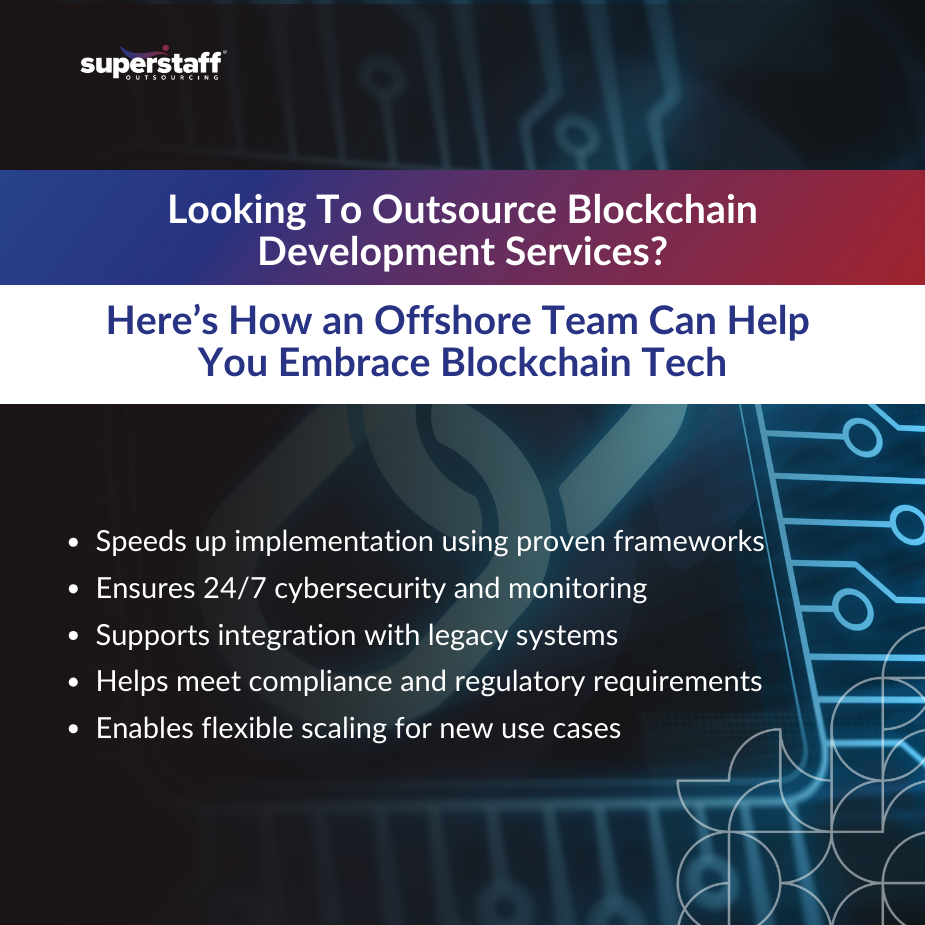
Blockchain is transforming how financial institutions operate—but implementation isn’t plug-and-play. From real-time settlement systems to fraud prevention and smart contracts, blockchain offers an entirely new infrastructure for financial services. Yet, as promising as it is, adopting this technology is far from simple.
For banks, credit unions, and fintech companies, blockchain introduces a range of advantages: improved transparency, enhanced security, and operational efficiency. But integrating blockchain into existing systems often reveals a complex web of challenges—technical limitations, a steep learning curve, compliance concerns, and legacy system incompatibilities. The solution? Outsource blockchain development services.
Without the right resources and expertise, institutions risk falling short of realizing blockchain’s full potential. That’s where strategic IT outsourcing comes in. Organizations that outsource gain instant access to experienced developers, industry best practices, and proven deployment frameworks. This approach streamlines implementation, reduces overhead costs, and ensures better scalability and compliance. Rather than building everything from scratch, financial institutions can move faster and more securely with trusted partners guiding the way.
In this blog, we’ll break down how IT outsourcing can help financial organizations implement blockchain more seamlessly—from reducing risks to accelerating innovation.
Why and How Financial Institutions Outsource IT for Blockchain Projects
Blockchain adoption in finance is no longer optional—it’s becoming a competitive necessity.
Financial institutions can no longer afford to ignore blockchain. It’s now a critical asset in enhancing competitiveness, improving customer experiences, and complying with increasingly digital-first regulations.
Across banking, insurance, and fintech, blockchain is reshaping operations. It enables faster cross-border payments, enforces transparency with smart contracts, and simplifies Know Your Customer (KYC) and Anti-Money Laundering (AML) processes.
In many cases, regulators are encouraging digital modernization, pushing financial firms to adopt blockchain as part of future-ready infrastructure strategies. U.S. lawmakers are even considering legislation aimed at using blockchain technology to combat financial fraud and scams.
However, enthusiasm often clashes with reality. While the promise is clear, executing a successful blockchain integration plan is not as straightforward as flipping a switch.
But integrating blockchain with legacy systems is where many institutions hit a wall.
Internal IT Teams May Lack the Bandwidth or Expertise for Blockchain Deployment
Blockchain is not like other digital upgrades. Its decentralized architecture, consensus mechanisms, and data structure represent a sharp departure from traditional systems. Without dedicated resources, even seasoned IT departments may struggle to craft an effective blockchain implementation strategy.
The problem is twofold. First, there’s a global shortage of experienced blockchain developers. Second, building an in-house team is both time-consuming and costly, requiring ongoing training, recruitment, and tooling investments.
That’s a steep ask for firms that also need to manage day-to-day IT operations, cybersecurity, and digital transformation.
Outsourcing fills this gap with agile, expert teams that can support and execute a scalable blockchain implementation strategy from day one.

IT Outsourcing Gives You Immediate Access to Blockchain Specialists Without Long Onboarding Timelines
By working with an IT outsourcing provider, financial institutions gain on-demand access to blockchain developers with proven experience across multiple platforms. These partners bring cross-industry insights and technical fluency in solutions like Ethereum, Hyperledger Fabric, and Ripple, allowing for a more tailored and efficient implementation process.
Many outsourcing firms also leverage prebuilt frameworks and toolkits, significantly accelerating the go-to-market timeline. Instead of starting from scratch, businesses can build upon reusable components, minimizing trial-and-error and maximizing deployment efficiency.
Beyond talent, outsourcing also offers strategic support in mitigating implementation risks.
Blockchain Security and Compliance Require Vigilant, Around-the-Clock Monitoring
One of blockchain’s greatest strengths—immutability—can also be risky if not properly secured. Because blockchain systems are interconnected and public-facing, any vulnerabilities can quickly be exploited. With regulatory frameworks tightening around financial data protection, continuous monitoring is non-negotiable.
Outsourcing cybersecurity functions allows institutions to maintain 24/7 vigilance. Outsourced teams can manage threat detection, incident response, and penetration testing while ensuring blockchain solutions comply with regulatory standards like GDPR, SOC 2, and PCI DSS.
This hands-on, proactive protection keeps institutions compliant and prepared for audits while reducing internal workload.
When you outsource blockchain development services, your offshore partners can help you integrate the technology smoothly into your existing systems.
Integration With Legacy Systems Is One of the Biggest Roadblocks to Blockchain Success
The reality is that most financial institutions still rely on legacy systems—some decades old. Integrating blockchain with these systems without disruption is no small feat. That’s where experienced providers of blockchain development outsourcing services can make a critical difference.
Top-tier outsourcing partners bring specialized knowledge in hybrid infrastructure, API development, and system interoperability. They ensure seamless integration between blockchain platforms and existing databases, financial software, and customer-facing portals.
In addition, they manage large-scale data migrations and workflow automation while minimizing operational downtime and avoiding service interruptions.
With the right blockchain development outsourcing services in place, institutions gain not only technical integration but also improved agility and efficiency across operations.
Outsourcing Enhances Scalability, Allowing Financial Institutions to Expand Blockchain Use Cases Without Delay
Whether running a small pilot or scaling enterprise-wide blockchain adoption, outsourcing offers the flexibility to grow at your pace. When you outsource blockchain development services, you gain the ability to scale your team instantly—without the delays and costs of hiring and training new talent at each phase.
This model is particularly valuable for launching advanced blockchain initiatives such as asset tokenization, real-time compliance tracking, and decentralized finance (DeFi) services. It also supports resource reallocation during critical development milestones without exhausting your in-house team.
But not all outsourcing partners are built the same—choosing the right one is crucial.
Selecting the Right Outsourcing Partner Ensures Blockchain Success
Not all outsourcing providers are equally equipped for blockchain integration. Financial institutions should look for partners with a proven track record in fintech and blockchain implementation, including a strong understanding of regulatory environments.
Ask for case studies, client references, and team credentials. Evaluate their development frameworks, security protocols, and ability to adapt to your internal workflows. A good cultural fit—combined with transparent communication and strong data governance—is just as important as technical expertise.
Outsourcing done right becomes more than a staffing solution—it becomes a strategic partnership that fuels transformation.
With the right partner in place, blockchain can unlock long-term business value.
Ready to Outsource Blockchain Development Services? It All Starts With the Right Partner
Blockchain adoption can be a game-changer for financial institutions—if done right. Strategic IT outsourcing enables firms to overcome talent shortages, reduce implementation risks, accelerate timelines, and ensure secure integration with existing systems.
Outsourcing is no longer just a cost-saving tactic—it’s a competitive advantage. It gives you access to cutting-edge expertise, flexible scaling, and operational continuity as you future-proof your financial services.
Partner with a trusted outsourcing firm like SuperStaff to turn blockchain goals into reality. Let’s talk about how we can support your transformation.






